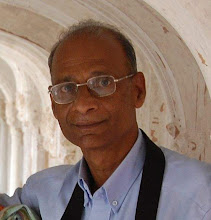Ustad Zakir Hussain played in Cochin, on the lawns of the Bolgatty palace. The Dutch had built it. The English inherited and bequeathed it to the Cochin Raja. People got its rights with Independence and the Tourism Department of Kerala gave it over to the Dutch and the British and all other nationalities who now come as visitors. Hundreds of them took part in the mega show of music as announced by the promoter who ran a dancing school. She was the disciple of a well known dancing couple and an excellent organizer with a few foreign tours. This one is mega beyond her scale. So an event management group was approached and they did all arrangements. Two of their men climbed the ladders on stage at 6.45, sharp; fifteen minutes after the show had to start. They tied the last pieces, two white muslin, pieces of cloth above the platform which was draped like a divan with gold edged Kerala cream coloured cloth. One of them meant this flag is now colourless and meant no nationality. The second one meant peace be with you. And with you also, said the crowd when the compere wished a happy time. She highlighted the Ustad and actually the par lights focussed him and the cameras flashed and the rest on the stage were almost forgotten. So the ustad himself corrected her saying he was only accompanying the flutist, young Shashank who was really great. Also he remarked that the organisers must have sold standing room tickets to the mosquitoes. The most famous of all insects in connection with music certainly paused a challenge, a physical threat. And a couple of koels, the most famous of all singing birds of Kerala sat on a high branch of an ancient tree fearing the current and light and the many times amplified sound. It was a dark evening of early Magh, the month of festivals. Sound and rhythm played an enormous role in all festivals. The Chenda, that superb war drum beaten by a hundred strong men making excellent music made celebrations. And here in the lawns of a palace by the back waters the Ustad and his calm faced co player made a festival of percussion.
After it rained Amrithavarshini, the Ustad said no more flashes and the crowding with cameras. Enough I gave, now you go. Enough for the photographers. Now for the music lovers. Then the music turned serious. The long shapely fingers were magnified and projected on large screens both sides. Their movements made the rhythm. Some say the rhythm made movements. Hearts beat the rhythm. Breathing grew fast and slowed down to the rhythm. Walking and running and even sitting and sleeping were tuned to the rhythm. Rhythm made the planets revolve and stars pulsate. Universes formed and reformed to the rhythm. Rhythm is an expression of the divine, the unknowable that controlled all or as some say is controlled by all events and processes. Rhythm or rthm as in Upanishads meant much more than the thalam, the beats of specific rhythms, the spacing of explosive sounds emanated on the tight skins of hollow tubes and vessels stylised into beautiful instruments. The humans and animals and all inanimate things are said to be such instruments. ‘Lord, play me like a lyre and let the music of joy flow from me’ – was a prayer. Music is the expression of the rthm in sounds like painting is its expression in lines and forms and colours. The rhythm of thought affected humanity through the movements and revolutions. The rhythm of creation growth and destruction made the sciences and philosophies. Knowledge is the waving rhythm of minds, The rhythm, the beats the movements of these lovely fingers, shown so large and clear on these white screens and heard so loud and clear in these huge loudspeakers. The programme ended abruptly at the end of two hours and the crowd melted into the night
Wednesday, February 21, 2007
Subscribe to:
Post Comments (Atom)

No comments:
Post a Comment